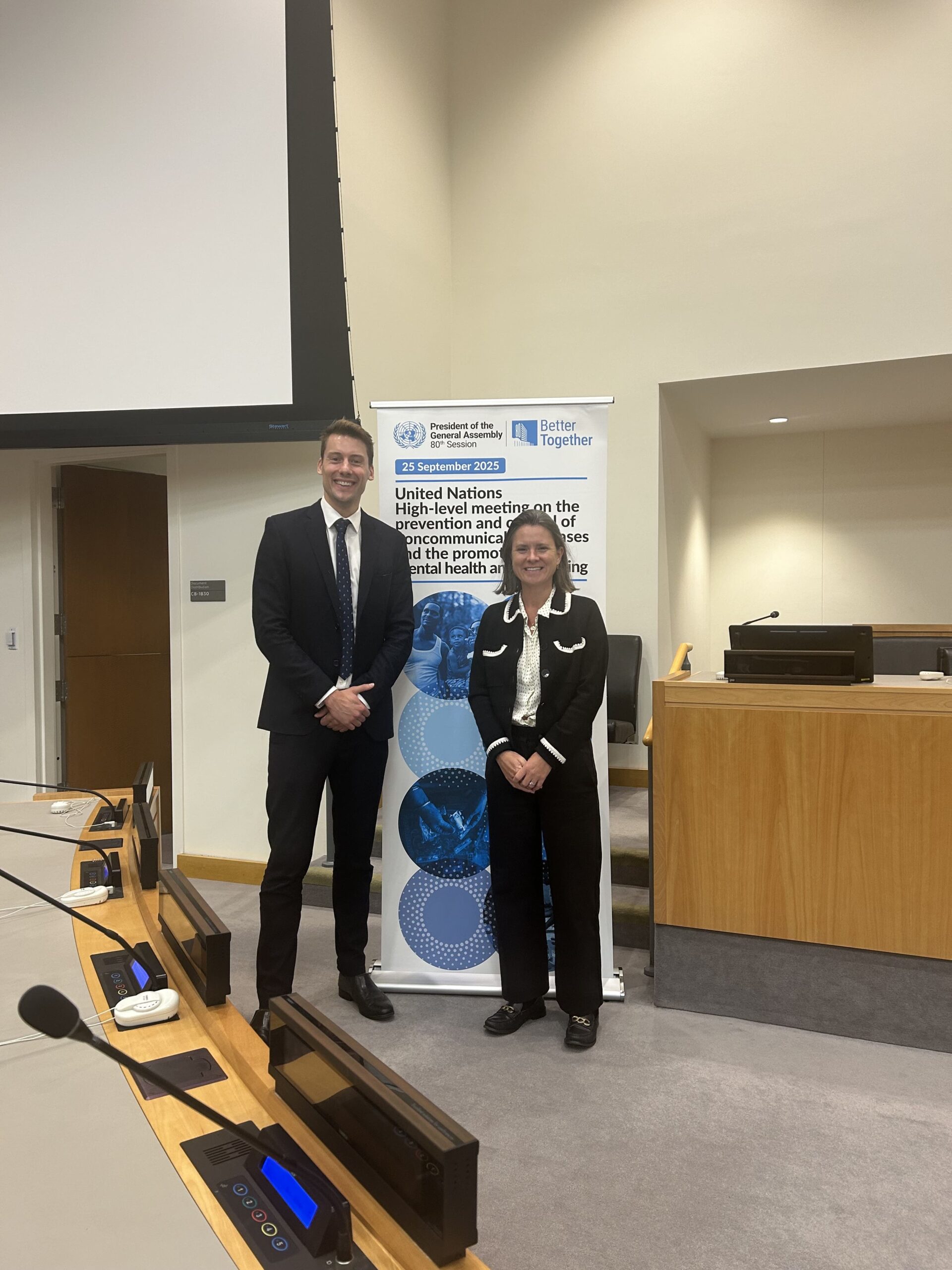This week, Amy Thompson, Director of Operations, and Dan Hunt, PhD researcher and member of Local Health Global Profits (LHGP), have been representing the University of Bath at two major international public health and climate events. They have travelled to New York to participate in the fourth UN High-Level Meeting on the Prevention of Noncommunicable Diseases (NCDs) and Mental Health on Thursday 25 September, and in Climate Week NYC (20-27 September), which is run in partnership with the United Nations General Assembly.
As hundreds countries gathered at the Headquarters of the United Nations to negotiate a global agreement on the world's leading causes of death, one could be forgiven for thinking the pathetic fallacy was a bit ‘on the nose’.
Beneath New York’s tempestuous and rain-soaked sky, the public health community stood before an unusual agreement: a compromise that watered down bold actions needed to address the structural drivers of global disease and death, but also a pact that, until recent days, could have been so much worse.

First, the good.
A UN High-level meeting on noncommunicable diseases (NCDs) and Mental Health is an extraordinary moment for global health diplomacy. Gathering Heads of State and Government together, it creates an opportunity unlike any other for countries to set the political agenda, and work together to tackle common harms to health, planet, and sustainable development.
The global community has adopted SDG target 3.4, to reduce premature mortality from NCDs by one third by 2030, yet with just five years remaining, only an estimated 19 out of 194 countries and territories are on track to achieve it. This meeting – just the fourth of its kind over the past 15 years – is critical to rejuvenate and negotiate urgent actions for global health.

Countries clearly care deeply about NCDs and mental health. NCDs – those long-term (‘chronic’) diseases such as cancer, heart disease, types of diabetes, respiratory diseases, sickle cell disease, oral health, and much more - cause around three in four deaths globally. For the first time, mental health has been included in the High-level meeting. Many countries expressed mental health as one of the leading causes of disability, as well as a profound issue of dignity and human rights.
Together, NCDs and mental health profoundly impact every country around the world. NCDs are seven of the world’s ten biggest killers. Premature disease and death create an ignominy that rips apart families and communities. The economic and social productivity of countries is damaged, and costly and unnecessary health-care burdens are created. The emotion was clear at the meeting – a staggering 154 UN Member States applied to speak about the life-changing impacts of NCDs and mental health in their countries.
There are many gains to celebrate. The political declaration commits to decriminalise suicide. Countries have agreed language – hard fought after it looked lost – stating that “economic, commercial and market factors” do harm health. For the first time, targets are agreed to see 150 million fewer people using tobacco, 150 million more people with hypertension under control, and 150 million more people with access to mental health care by 2030. Where air pollution was nearly absent from the text, policies to tackle a range of eight industrial drivers of toxic air are now recommended, although stopping short of describing the fossil fuel industry as a source of this harm. And recognising the growing attention to climate and health, there is explicit language about the need to design and implement policies that protect “countries most vulnerable to the adverse effects of climate change, natural disasters and extreme weather events”.
Addressing the commercial determinants of ill-health means comprehensive attention to health-harming products, by rapidly scaling their respective technical packages, and by renewing technical attention to air pollution policies.
It also means attention to the range of practices deployed to influence the multisectoral domains of politics, science, finance, supply chains, labour, and waste: practices which shape public norms and political discourse.
Source: Intervention of the Centre for 21st Century Public Health, University of Bath, at the Panel (1) High-level Meeting on the Prevention and Control of Noncommunicable Diseases and the Promotion of Mental Health and Well-being, 25 September 2025
Unlike usual health meetings that happen at the World Health Organization (WHO), the political declaration happens at the UN level. It is not technically complete – the declaration will now be “transmitted” to the UN General Assembly to be formally adopted. Although countries could still launch a last ditch attempt to reject it here, the decision is taken by consensus, and the President of the General Assembly acknowledged the “broad support” of scores of countries. In short, such agreements at the UN level matter – NCDs, and their commercial determinants, are not only core to the right to health, but also to the right to a healthy environment, and to sustainable and equitable development at large.
Now, the bad.
Just four products – tobacco control, alcoholic beverages, ultra-processed foods and beverages, and fossil fuel products – are responsible for almost a third of global deaths. With this in mind, delegates in attendance from the University of Bath’s Centre for 21st Century Public were particularly concerned about the ability to repair the broken and unsustainable economic systems, business practices, and industrial products that are driving some of the greatest contributors to rising global mortality.
Together, how these systems, practices, and products impact on health and equity are known as the ‘commercial determinants’ of ill-health. Addressing the ‘determinants’ of health means looking beyond hospitals and clinics, and instead understanding that structures of power, influence, and market forces shape health and equity, and should be treated as such.
Yet, over several months and the watering down of successive drafts, the Political Declaration has fallen into a trap of fixing disease when you see a doctor, rather than never needing to be there in the first place. As the Centre for 21st Century Public Health said in its statement to the UN High-level meeting, this is a false choice:
The positive economic and social benefits of health-sensitive policies are clear. But without comprehensive technical attention to structural drivers of harm to health, planet, and equity, we risk failing to medicalise our way out of NCDs and mental health as pressing development challenges.
Source: Intervention of the Centre for 21st Century Public Health, University of Bath, at the Panel (1) High-level Meeting on the Prevention and Control of Noncommunicable Diseases and the Promotion of Mental Health and Well-being, 25 September 2025
We can see this in what is missing from the text.
But we can also see it in three examples of what remains. First, the text persists in referring to “the private sector” to describe the role of business in policy implementation. This is a dangerous overgeneralisation. An essential medicines producer, a local bike repair shop, and the tobacco industry are all ‘the private sector’. Simplistic language in such important documents risks needlessly disguising corporate harms and the laundering of reputations. The good news is that this can be easily fixed with a recognition of conflicts of interest or of misaligned incentive structures.
Second, despite the WHO championing a “bold push” for countries to raise real prices on tobacco, alcohol, and sugary drinks by at least 50% by 2035 just two months ago, countries sought to water down this language. Countries should, instead, “consider introducing or increasing” taxes on tobacco and alcohol. Taxes on sugar-sweetened beverages are missing entirely. With pressures on cost-of-living and the retreat of global development assistance, making polluters pay for the damage they cause is more urgent than ever before. It’s also common sense. This decision is not informed by public health evidence.
And third, despite tobacco, alcoholic beverages, ultra-processed foods and beverages, physical inactivity, and air pollution, all being recognised as core risk factors for disease, the Political Declaration muddies the waters about what should be done. For all except air pollution, WHO has already looked at the evidence and set out what should be done, through a set of ‘technical packages’. Yet confusingly, the political declaration cherry-picks parts of these packages, rather than recommending them wholesale. This might sound pedantic, but it matters. Countries have already agreed that they are important. Revisiting and reprioritising them creates a real risk of disputing what does and doesn’t count as a valid, evidence-based policy. “Why should it be done if isn’t it in the Declaration?”, detractors can murmur.
Finally, we’ll probably never be privy to the strategies and tactics that health-harming industries used to water down efforts making them accountable for the damage they cause. Negotiations on the agreement happen between countries, which themselves are exposed to lobbying from public and business interests. Some investigative journalism has identified how the alcohol industry has attempted to lobby national governments to resist alcohol policies.
In summary, one voice reflecting on the UN General Assembly was powerful:
“Often, governments face fierce opposition from industries that profit from unhealthy products.
Source: Dr Tedros Adhanom Ghebreyesus, WHO Director-General.
So, where does it leave us? NCDs are the world’s biggest causes of global deaths, and the knowledge, evidence, and burden of mental health only continue to grow. We know what policies are urgently needed. A political failure to address their structural drivers will not make those challenges go away – it only makes them worse.
All articles posted on this blog give the views of the author(s), and not the position of the IPR, nor of the University of Bath.
Respond




